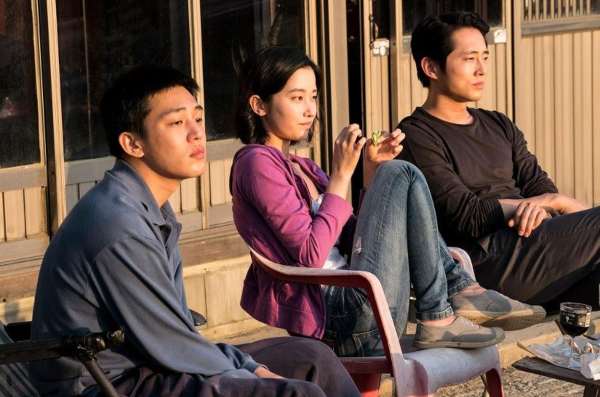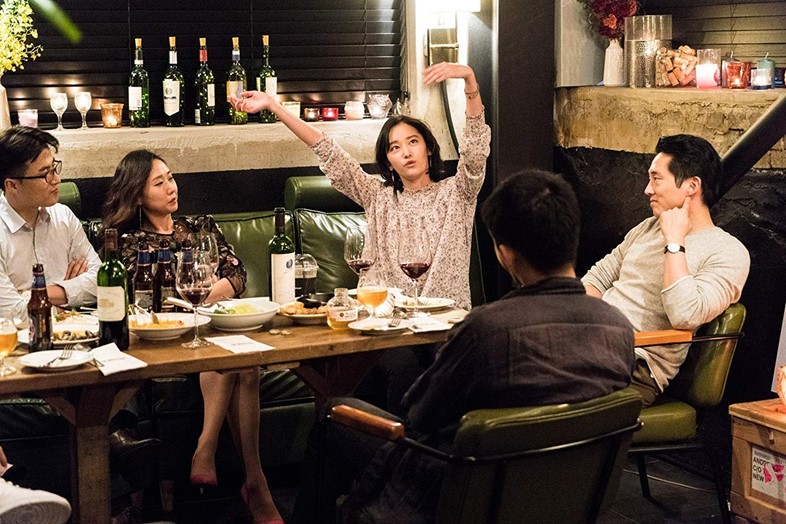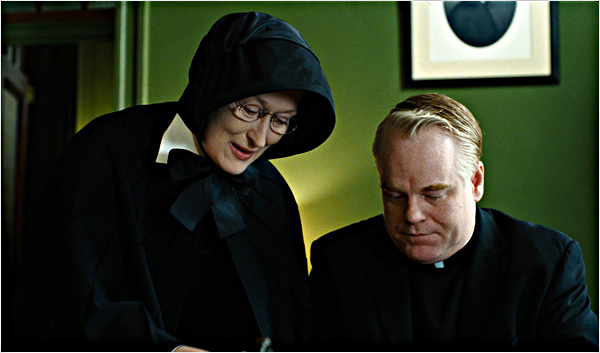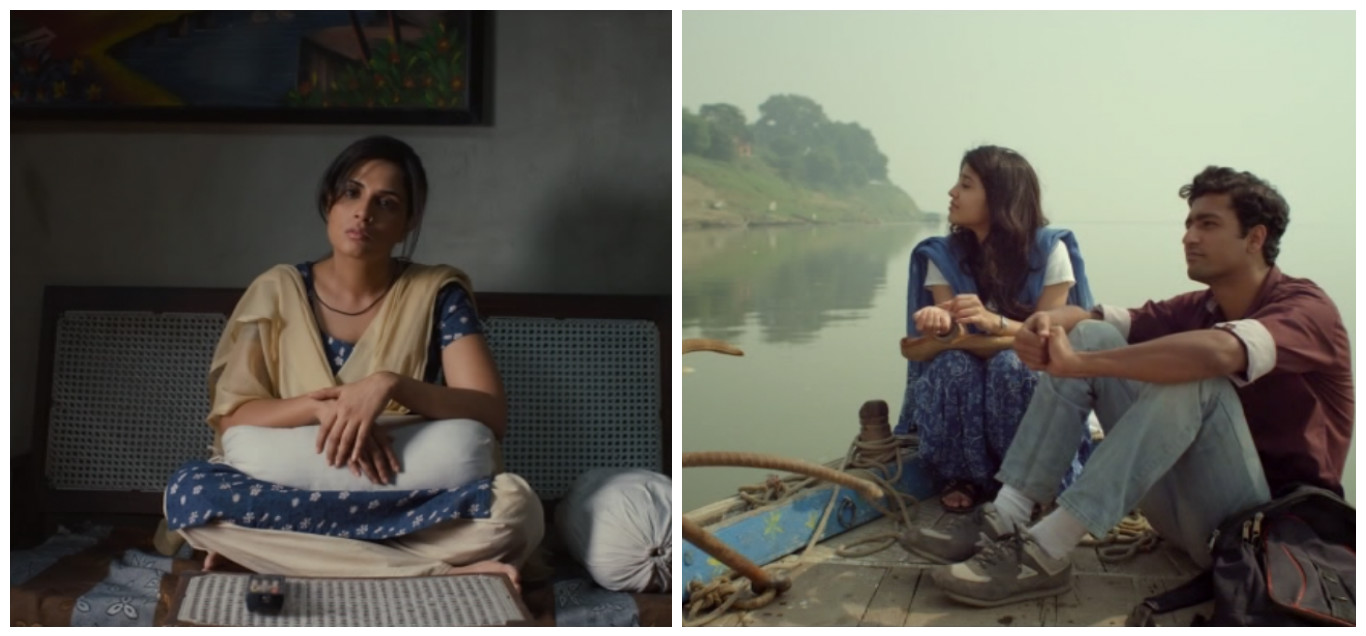BURNING
BURNING : MOVIE REVIEW
5 STARS / 5 : OUTSTANDING ( with rich potential to be a masterpiece)
DIRECTOR & CO-WRITER : LEE CHANG-DONG
SOUTH KOREAN , 2018 ( ENGLISH SUBTITLES AVAILABLE)
Lee Chang-dong’s ‘ Burning ‘ is a modern Korean love letter to cinephiles. The kind of sublime but inscrutable love letter that may drive you crazy. The hypnotic story about a girl in Seoul who leaves behind a boy she briefly met to move over to a moneyed enigmatic young man, throbs with shades of everyday life, class barriers , shifting love and then something else. Smooth cinematography of languid fluidity, and music – haunting in its absence and more so when it makes it guest appearance – deepen the immersion. Pic’s thematic shift at the two-thirds stage from emotion-based drama to thriller, put me off initially, as I suspected it had traded the challenging myriad complexities of the former to the easier seductions of the latter. But days after watching the film, its mood and zeitgeist continued to inveigle the mind and invite the revised impression that the movie maintains its quality across two genres where many other directors would struggle to keep the ball rolling even if given just one track.
There’s something to be said for a director of this caliber who begins his film with a slightly asymmetric close-up shot of a van door with its bolt in the middle, from the side of which smoke issues, as if the bolt is smoking.
We are introduced to the fey grace, slender limbs and slyly endearing face of Hae-mi ( Jeon Jong-seo) as she stands in cheer-girl outfit outside a store on a busy city street and deploys her undulating body language to lure customers inside. Her chosen gig of the moment – a loopy promo-job strutting on the street – betrays the imprecise nature of her ambition. She beholds Jong-su ( Yoo Ah-in), a childhood acquaintance, and quickly takes a fancy to him. Turns out he had called her ugly in childhood and she eventually gets plastic surgery done, with a view to bedding that boy should she ever see him again.
But Hae-mi has some interesting missions up her spandex sleeve. She has saved up to go visit Africa, and entrusts Jong-su to look after her apartment and a cat that may or may not exist. On return, she is in tow with Ben – a handsome young man who sports a Porsche and a designer apartment inside a guarded tower. From here on, Jong-su, who’s taken a steady liking towards her, will never again have the intimacy of Hae-mi, who thinks she has now fortuitously conga-lined into a higher orbit with the suave, wealthy Ben. Jong-su cautions her to be careful with this enigmatic immaculate colt who is at a higher social and intellectual level compared to her – what could Ben possibly desire from Hae-mi, except for perhaps a slight naivete and less jadedness compared to the set he usually hangs out with ?
And then she disappears… Will we see her again ? Jong-su is distraught and fraught with worry, but being a man of controlled exterior we do not see his angst that much in his visage, even as he frantically investigates day after day. As for Ben, he is not in the least worried, as he smiles coolly and reassures Jong-su.
It is stunning that a sixty-two year young director has made this film about twenty year olds with such naturalism and conviction. The maturity is on unmistakable display of course , but Lee’s age-transcending triumph lies in the fluid real manner he depicts the world of these twenty somethings – their silent glances, shift of partnerships, jealousy, cash-strapped miasma, the comfort of richer environs – all in a smooth understated way - the way they look chat and laugh in social settings from chic restaurants to homes.
Across-the-board superb acting is led by the winsome Jeon Jong-seo as the girl who keeps the story floating. The delight in her face and movement of her facial musculature when she beautifully pantomimes the popping of an orange segment into her mouth , is a synecdoche of the carefree, slightly ditzy, totally endearing persona on display. Steven Yeun perfectly essays Ben as the measured player who smiles and emotes with icy coolness throughout. With sculpted cheekbones, perfectly groomed mien, a very fair complexion and dressed chic-casual, he is like the aristocrat who is above mortal afflictions like worry and the maladies of money and love. Yoo Ah-in joins the dysphoric party with his sneakily effective rendering of Jong-su. A little sleepy-eyed and stoic with little ambition at the start, Ah-in’s young man then gets the subtle churn, the sedate simpleton persona swirling out into the subtle crease of worry that governs his still careful actions.
Progression of character arc is again a delicate triumph. In a different way from Jong-su’s trajectory, Haemi’s free-flowing persona also gradates - the emotional eddies of moving from a cash-constrained boy to rich partner, occasionally clouding her face. There is a look she gives to Jong-su when she goes away with Ben early in the story – it is not intense, but as a reflection of the remnants of her honesty, it is sustained and rather doleful as if to say ‘ I’m sorry, but this is how life usually is ’. Ben, on the other hand, is frozen in his smile and cool attitude – perhaps as a reflection of how cold materialism never changes, perhaps as a testament to his implacable persona.
Pic’s proclivity, as masterminded by Lee, to linger on the scenes, to let the sequence breathe and soak in the milieu is an aesthetic luxury, free-verse poetry. It is also the element that will draw away a section of viewers, leaving the cineastes alone close to the story’s bone. Lens’ latency here thus calls to mind other enigmatic films like Carlos Reygadas’ ‘ Stellet Licht ‘ ( 2007) , and Michael Haneke’s ‘ Cache ‘ (2005) – the latter especially for the way the scenes are recording with an unadorned clarity, as though with a camcorder, but in ‘Burning’ that supposed handycam is held by cinematographer Hong Kyung-pyo as if he is expertly wielding a Steadicam.
Lee lobs the conceit that some of Jong-su’s scenes may not have actually happened. Jong-su is about to partake in the beast with two backs when what we see eventually arcs around to a nebulous streak of light on the wall and the scene goes silent – are there two people or just one in the room ? This narrative trickery is compounded by Jong-su’s masturbatory scenes – was it only him all along ? In an elaborately explanatory review with ‘ Hollywood Reporter ‘ ( in this matter, Lee is the polar opposite of the notoriously non-explicatory Kubrick ), the director-co-writer casts the climactic scene in a similar haze of uncertainty – Did it really happen ?, the director asks ! I found this a little too provocative, like pulling the carpet out from under you too often, but then with time, I came to accept how much he wants to advance the thread’s narrative nebulousness. Pic is based on the much-feted writer Haruki Murakami’s ‘Barn Burning ‘ – and the film’s complexity is an able testament to Marukami’s slippery oeuvre. Lee, being a published writer himself, brings other special writers into the mix. Jong-su, initially more a simplistic farmboy-type, surprises us when he says his favourite writer is William Faulkner – the lauded twentieth century American writer known as much for his stylistic narrative techniques as for his psychologically charged telling, just like this story.
But this is not a dead-serious story, except when the going gets tough later on. Its moody reveries are leavened by Hae-mi’s antics – not only her lilting hand gestures, but also the child-like naivete in her words. She can’t believe Ben would bring a small rock into a restaurant only to perpetrate a sly trick on her – ‘did you really do that ?!’ , she asks with mounting surprise. When Ben mentions a metaphor, she cheerily asks him what a metaphor is, and Ben, instead of acting like a prick, sportingly parries her ignorance.
Lest you think I am only using her to take the mickey out, witness the best scene of the entire film heralding her as a zephyr against an intensely moody twilight. Hong and Lee’s camera gently swoops around to come low and look up at the numerator of Hae-mi as she takes flight as few other actresses have. A deeply sexy saxophone sets forth. The scene flows like a fever dream sublimely balletic and lusciously languorous, a joint disjointed by unadulterated thinking, first covering the dance of the angel and then scanning the dying horizon. It is the amongst the best sequences ever conceptualized in any language.
Side-tracks serve not to unnecessarily defocus the thread but to fill out the unwieldly vagaries of real strange life. As a mark of bleak existentialism, the parents here as absent even as they are present, effectively orphaning their children. Jong-su does not have the luxury of focusing only on Hae-mi and Ben – his volatile father is caught in a court-‘n’-prison vortex, with the son having to attend to the fall-out. His mother had run away long ago to escape an unhinged husband and when she meets her son years later, any poignancy is thrown out the window as his middle-aged brightly dressed and decked mother speaks to him in a superficial, air-headed way, checking her smartphone frequently, while Jong-su sits without mobile phone and gazes at this relative stranger with a faint mixture of wonder and amusement. He goes to visit Hae-mi’s mother, who is not in any hurry to welcome back her daughter. ‘Tell her not to come back without fixing her credit card debt’, she says. You remember a line from the Reema Kagti-directed ‘Talaash’ – ‘A lone girl goes missing, and nobody even cares’.
Intensely cinematic, deeply dramatic and lushly reflective, ‘Burning’ thus brings us back to the glory days of the 1960s and 70s when unhurried films like these reached the zenith of their expression. Jong-su cautions Hae-mi that Korea has many Gatsbys. It is good to know that it also has a different kind of Nick Carraway.
UPN
UPNWORLD welcomes your comments.












0 COMMENTS
WRITE COMMENT